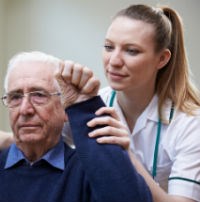Information for the public

NICE has written advice about care and support for people with learning disabilities as they grow older.

The advice is for everyone who works with people with learning disabilities, and their families and carers.

We've produced an EasyRead version of our advice.
If you have a learning disability you may want to look at this with support from a family member, friend or carer.
What does the advice say?

The advice is about:
- helping you get support from services like health, housing and social care
- making sure your views come first
- involving everyone who supports you
- helping you look after your health as you get older
- helping you prepare for the future
- making sure staff have the right skills to support you.
This video also explains what NICE has said.
What is the advice for?

We want this advice to help people get the best care and support. It will help staff meet your changing needs as you grow older.
Improving services for you
There is lots of advice in the guideline about care and support. NICE has also worked with experts to agree the 5 things that services could do to make the most difference to people’s care. This is called a quality standard.
- You are always listened to when staff check about your care needs. You should always be able to say what you need, what things you like and what you want from your life.
- You have 1 person that you can contact if you have questions or need help from different services.
- You are supported to talk about how your life and needs may change as you get older, and to make plans for those changes.
- You have a detailed health check up every year.
- If you need to go into hospital, you can meet the people who will look after you before you go so you can get to know each other.
In the news
Read NICE news about how this guideline will help.
People growing older with learning disabilities should get regular health checks, says NICE

Where can I find out more?

These people can give you more advice and support.
Their information is not written by NICE.
- Mencap, 0808 808 1111
- Foundation for People with Learning Disabilities
Who wrote this guideline?

NICE wrote this guideline with people who have learning disabilities, their families and carers and staff who support them. All the decisions are based on the best research available.
ISBN: 978-1-4731-2923-8
Additional resources
This page was last updated: